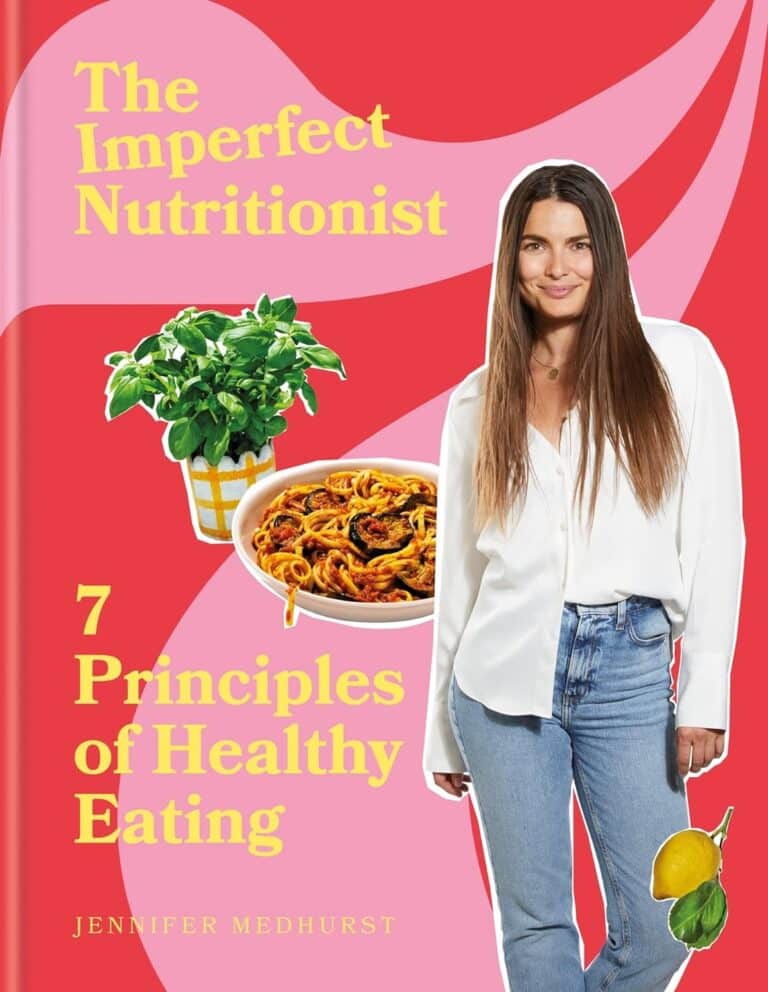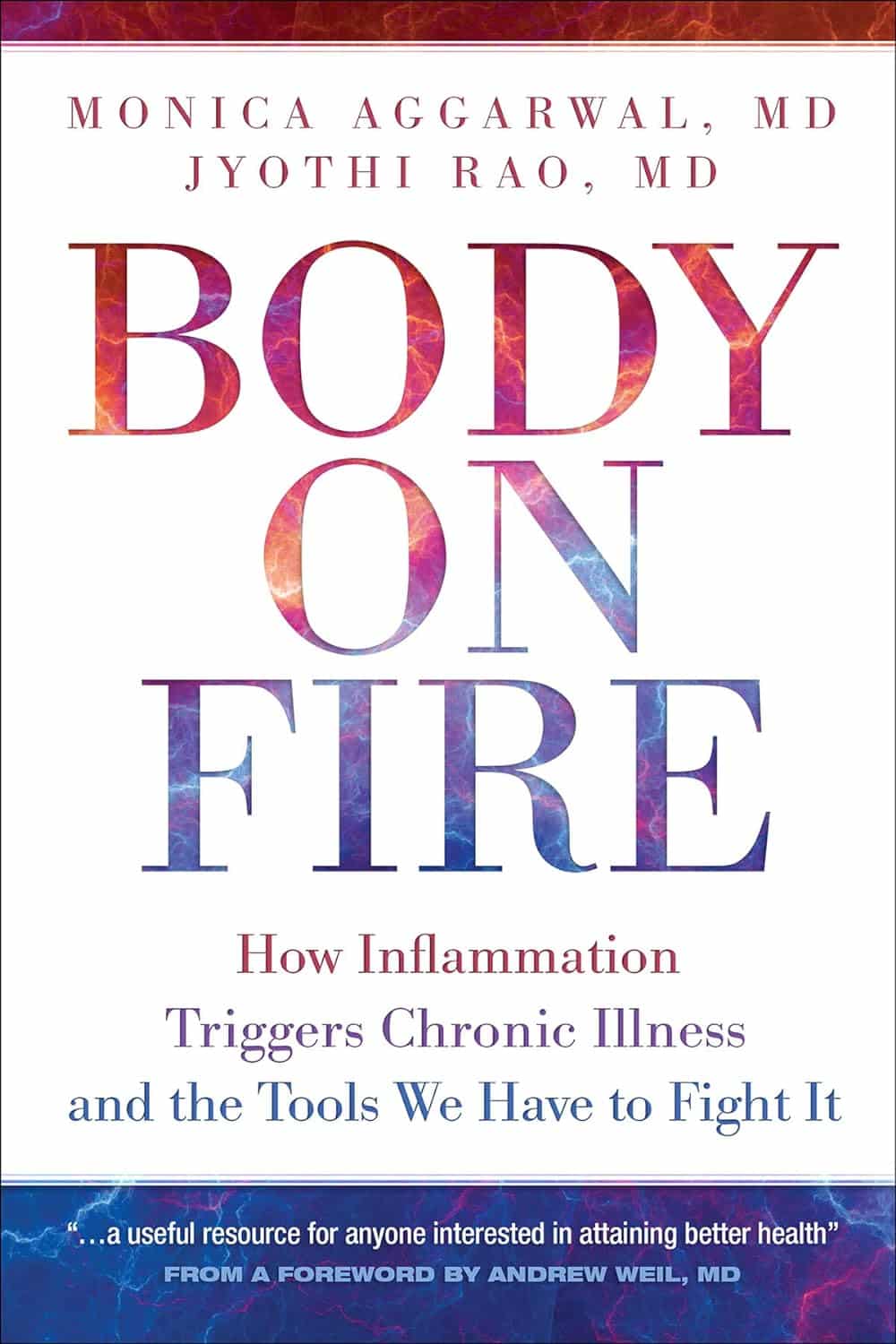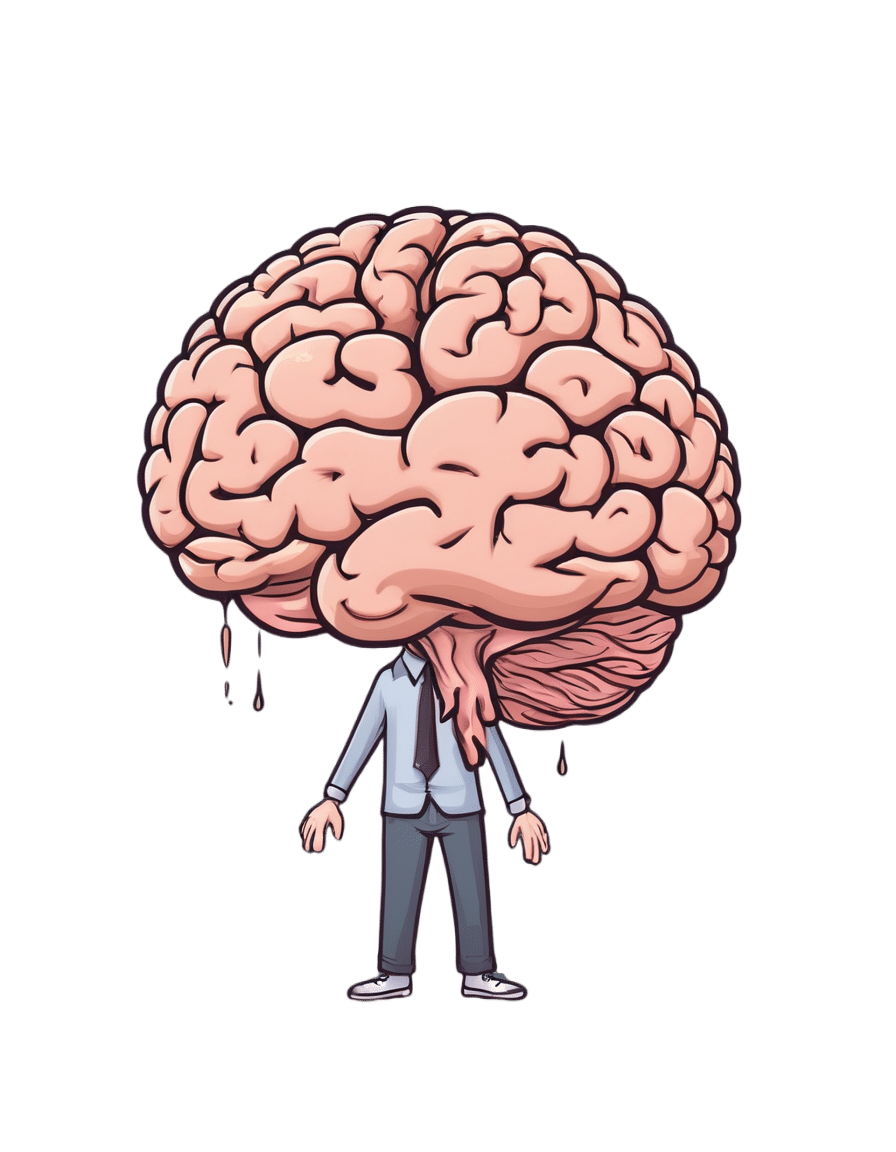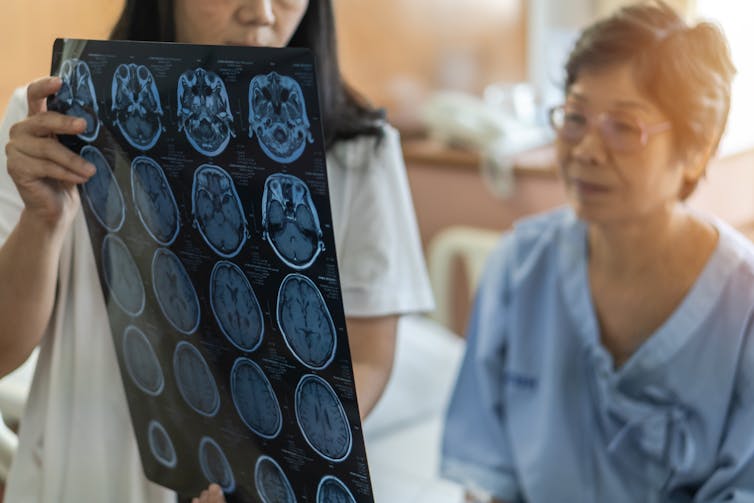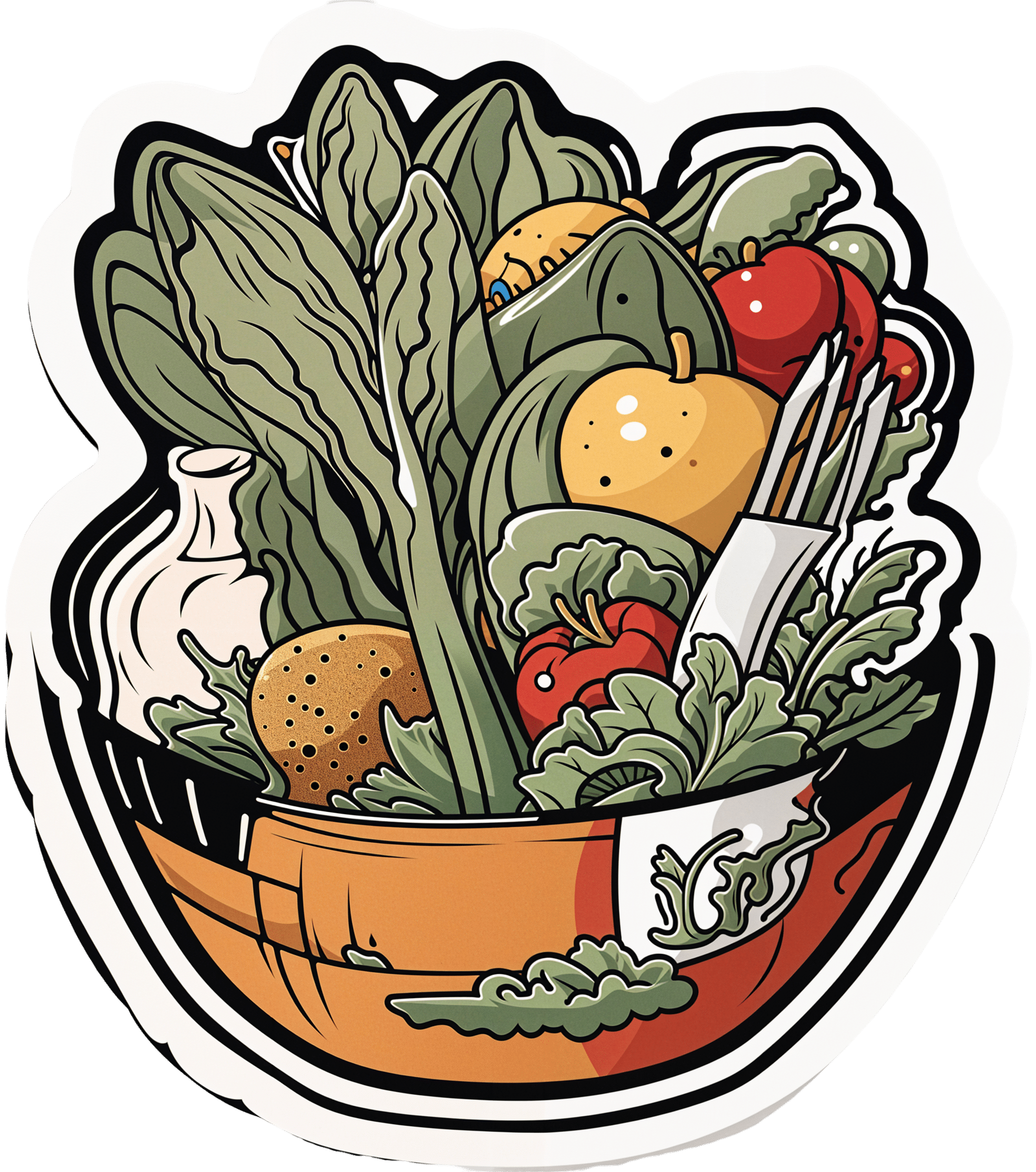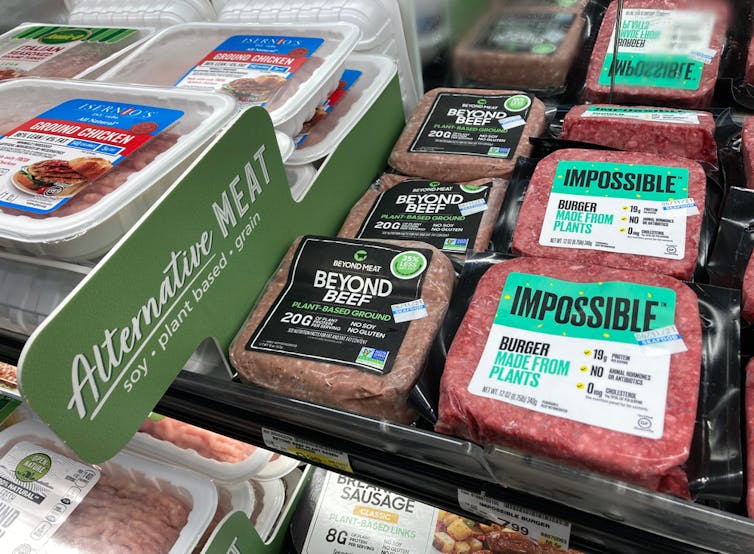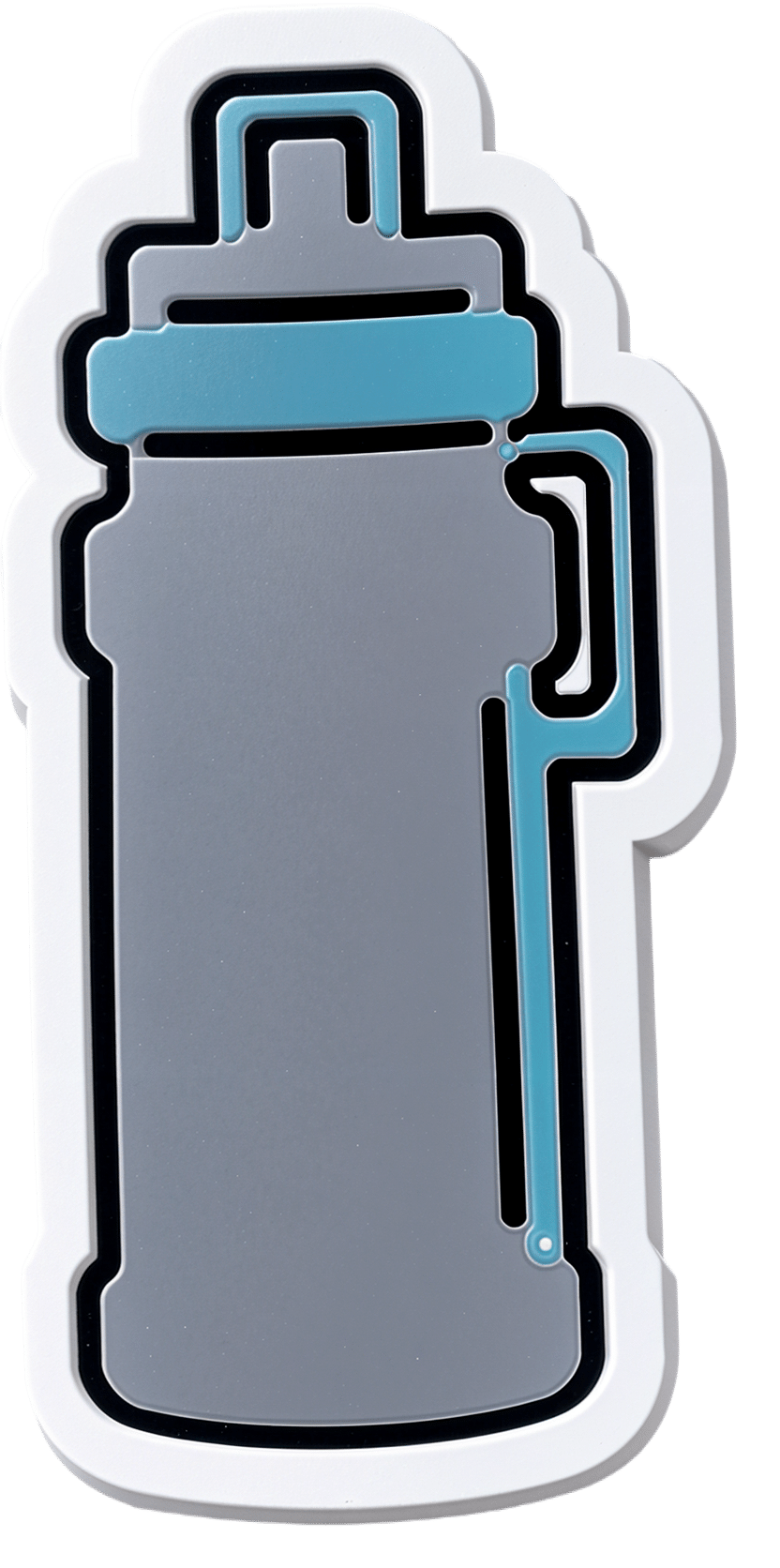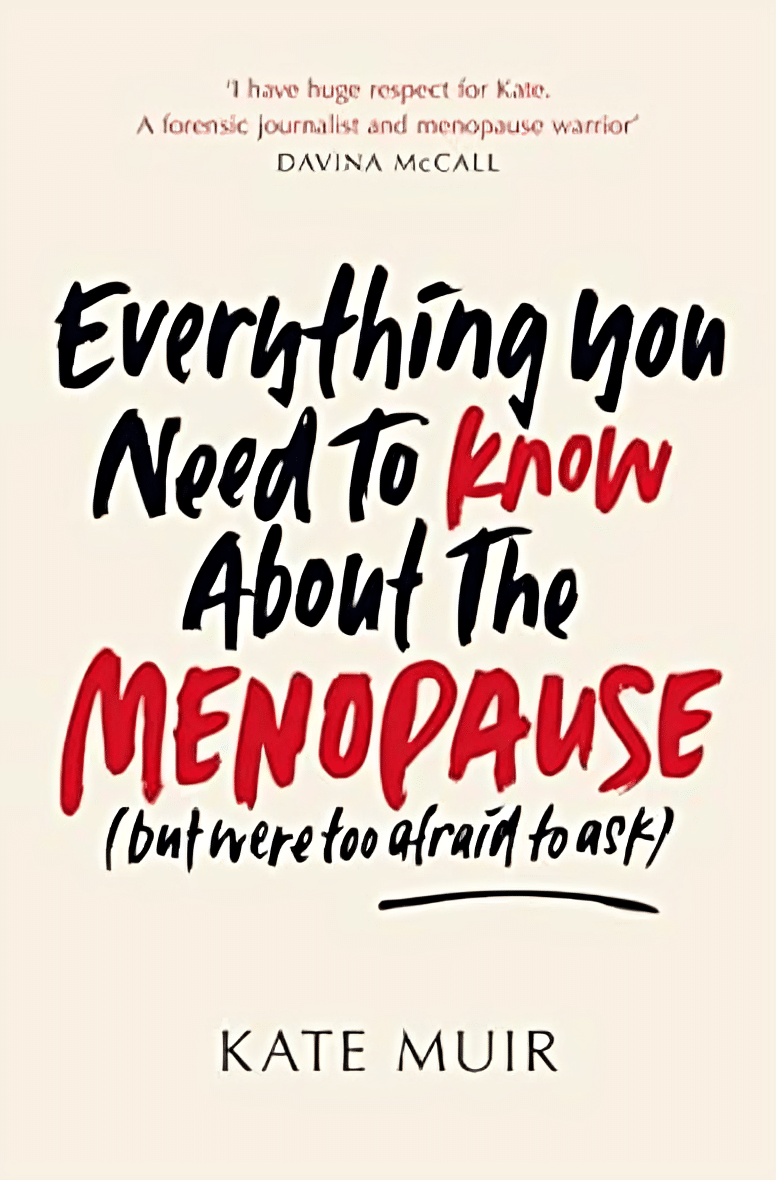
Everything You Need To Know About The Menopause – by Kate Muir
10almonds is reader-supported. We may, at no cost to you, receive a portion of sales if you purchase a product through a link in this article.
Kate Muir has made a career out of fighting for peri-menopausal health to be taken seriously. Because… it’s actually far more serious than most people know.
What people usually know:
- No more periods
- Hot flushes
- “I dunno, some annoying facial hairs maybe”
The reality encompasses a lot more, and Muir covers topics including:
- Workplace struggles (completely unnecessary ones)
- Changes to our sex life (not usually good ones, by default!)
- Relationship between menopause and breast cancer
- Relationship between menopause and Alzheimer’s
“Wait”, you say, “correlation is not causation, that last one’s just an age thing”, and that’d be true if it weren’t for the fact that receiving Hormone Replacement Therapy (HRT) or not is strongly correlated with avoiding Alzheimer’s or not.
The breast cancer thing is not to be downplayed either. Taking estrogen comes with a stated risk of breast cancer… But what they don’t tell you, is that for many people, not taking it comes with a higher risk of breast cancer (but that’s not the doctor’s problem, in that case). It’s one of those situations where fear of litigation can easily overrule good science.
This kind of thing, and much more, makes up a lot of the meat of this book.
Hormonal treatment for the menopause is often framed in the wider world as a whimsical luxury, not a serious matter of health…. If you’ve ever wondered whether you might want something different, something better, as part of your general menopause plan (you have a plan for this important stage of your life, right?), this is a powerful handbook for you.
Additionally, if (like many!) you justifiably fear your doctor may brush you off (or in the case of mood disorders, may try to satisfy you with antidepressants to treat the symptom, rather than HRT to treat the cause), this book will arm you as necessary to help you get what you need.
Grab your copy of “Everything You Need To Know About The Menopause” from Amazon today!
Don’t Forget…
Did you arrive here from our newsletter? Don’t forget to return to the email to continue learning!
Recommended
Learn to Age Gracefully
Join the 98k+ American women taking control of their health & aging with our 100% free (and fun!) daily emails:
-
Body on Fire – by Dr. Monica Aggarwal and Dr. Jyothi Rao
10almonds is reader-supported. We may, at no cost to you, receive a portion of sales if you purchase a product through a link in this article.
There are times when you do really need a doctor, not a dietician. But there are also times when a doctor will prescribe something for the symptom, leaving the underlying issue untouched. If only there were a way to have the best of both worlds!
That’s where Drs. Rao and Aggarwal come in. They’re both medical doctors… with a keen interest in nutrition and healthy lifestyle changes to make us less sick such that we have less need to go to the doctor at all.
Best of all, they understand—while some things are true for everyone—there’s not a one-size-fits all diet or exercise regime or even sleep setup.
So instead, they take us hand-in-hand (chapter by chapter!) through the various parts of our life (including our diet) that might need tweaking. Each of these changes, if taken up, promise a net improvement that becomes synergistic with the other changes. There’s a degree of biofeedback involved, and listening to your body, to be sure of what’s really best for you, not what merely should be best for you on paper.
The writing style is accessible while science-heavy. They don’t assume prior knowledge, and/but they sure deliver a lot. The book is more text than images, but there are plenty of medical diagrams, explanations, charts, and the like. You will feed like a medical student! And it’s very much worth studying.
Bottom line: highly recommendable even if you don’t have inflammation issues, and worth its weight in gold if you do.
Share This Post
-
Men have a biological clock too. Here’s what’s more likely when dads are over 50
10almonds is reader-supported. We may, at no cost to you, receive a portion of sales if you purchase a product through a link in this article.
We hear a lot about women’s biological clock and how age affects the chance of pregnancy.
New research shows men’s fertility is also affected by age. When dads are over 50, the risk of pregnancy complications increases.
Data from more than 46 million births in the United States between 2011 and 2022 compared fathers in their 30s with fathers in their 50s.
While taking into account the age of the mother and other factors known to affect pregnancy outcomes, the researchers found every ten-year increase in paternal age was linked to more complications.
The researchers found that compared to couples where the father was aged 30–39, for couples where the dad was in his 50s, there was a:
- 16% increased risk of preterm birth
- 14% increased risk of low birth weight
- 13% increase in gestational diabetes.
The older fathers were also twice as likely to have used assisted reproductive technology, including IVF, to conceive than their younger counterparts.
Steven van Loy/Unsplash Dads are getting older
In this US study, the mean age of all fathers increased from 30.8 years in 2011 to 32.1 years in 2022.
In that same period, the proportion of men aged 50 years or older fathering a child increased from 1.1% to 1.3%.
We don’t know the proportion of men over 50 years who father children in Australia, but data shows the average age of fathers has increased.
In 1975 the median age of Australian dads was 28.6 years. This jumped to 33.7 years in 2022.
How male age affects getting pregnant
As we know from media reports of celebrity dads, men produce sperm from puberty throughout life and can father children well into old age.
However, there is a noticeable decline in sperm quality from about age 40.
Female partners of older men take longer to achieve pregnancy than those with younger partners.
A study of the effect of male age on time to pregnancy showed women with male partners aged 45 or older were almost five times more likely to take more than a year to conceive compared to those with partners aged 25 or under. More than three quarters (76.8%) of men under the age of 25 years impregnated their female partners within six months, compared with just over half (52.9%) of men over the age of 45.
Pooled data from ten studies showed that partners of older men are also more likely to experience miscarriage. Compared to couples where the male was aged 25 to 29 years, paternal age over 45 years increased the risk of miscarriage by 43%.
Older men are more likely to need IVF
Outcomes of assisted reproductive technology, such as IVF, are also influenced by the age of the male partner.
A review of studies in couples using assisted reproductive technologies found paternal age under 40 years reduced the risk of miscarriage by about 25% compared to couples with men aged over 40.
Having a male under 40 years also almost doubled the chance of a live birth per treatment cycle. With a man over 40, 17.6% of treatment rounds resulted in a live birth, compared to 28.4% when the male was under 40.
How does male age affect the health outcomes of children?
As a result of age-related changes in sperm DNA, the children of older fathers have increased risk of a number of conditions. Autism, schizophrenia, bipolar disorders and leukaemia have been linked to the father’s advanced years.
A review of studies assessing the impact of advanced paternal age reported that children of older fathers have increased rates of psychiatric disease and behavioural impairments.
But while the increased risk of adverse health outcomes linked to older paternal age is real, the magnitude of the effect is modest. It’s important to remember that an increase in a very small risk is still a small risk and most children of older fathers are born healthy and develop well.
Improving your health can improve your fertility
In addition to the effects of older age, some chronic conditions that affect fertility and reproductive outcomes become more common as men get older. They include obesity and diabetes which affect sperm quality by lowering testosterone levels.
While we can’t change our age, some lifestyle factors that increase the risk of pregnancy complications and reduce fertility, can be tackled. They include:
- smoking
- recreational drug taking
- anabolic steroid use
- heavy alcohol consumption.
Get the facts about the male biological clock
Research shows men want children as much as women do. And most men want at least two children.
Yet most men lack knowledge about the limitations of female and male fertility and overestimate the chance of getting pregnant, with and without assisted reproductive technologies.
We need better public education, starting at school, to improve awareness of the impact of male and female age on reproductive outcomes and help people have healthy babies.
For men wanting to improve their chance of conceiving, the government-funded sites Healthy Male and Your Fertility are a good place to start. These offer evidence-based and accessible information about reproductive health, and tips to improve your reproductive health and give your children the best start in life.
Karin Hammarberg, Senior Research Fellow, Global and Women’s Health, School of Public Health & Preventive Medicine, Monash University
This article is republished from The Conversation under a Creative Commons license. Read the original article.
Share This Post
-
Does intermittent fasting have benefits for our brain?
10almonds is reader-supported. We may, at no cost to you, receive a portion of sales if you purchase a product through a link in this article.
Intermittent fasting has become a popular dietary approach to help people lose or manage their weight. It has also been promoted as a way to reset metabolism, control chronic disease, slow ageing and improve overall health.
Meanwhile, some research suggests intermittent fasting may offer a different way for the brain to access energy and provide protection against neurodegenerative diseases like Alzheimer’s disease.
This is not a new idea – the ancient Greeks believed fasting enhanced thinking. But what does the modern-day evidence say?
First, what is intermittent fasting?
Our diets – including calories consumed, macronutrient composition (the ratios of fats, protein and carbohydrates we eat) and when meals are consumed – are factors in our lifestyle we can change. People do this for cultural reasons, desired weight loss or potential health gains.
Intermittent fasting consists of short periods of calorie (energy) restriction where food intake is limited for 12 to 48 hours (usually 12 to 16 hours per day), followed by periods of normal food intake. The intermittent component means a re-occurrence of the pattern rather than a “one off” fast.
Food deprivation beyond 24 hours typically constitutes starvation. This is distinct from fasting due to its specific and potentially harmful biochemical alterations and nutrient deficiencies if continued for long periods.
4 ways fasting works and how it might affect the brain
The brain accounts for about 20% of the body’s energy consumption.
Here are four ways intermittent fasting can act on the body which could help explain its potential effects on the brain.
1. Ketosis
The goal of many intermittent fasting routines is to flip a “metabolic switch” to go from burning predominately carbohydrates to burning fat. This is called ketosis and typically occurs after 12–16 hours of fasting, when liver and glycogen stores are depleted. Ketones – chemicals produced by this metabolic process – become the preferred energy source for the brain.
Due to this being a slower metabolic process to produce energy and potential for lowering blood sugar levels, ketosis can cause symptoms of hunger, fatigue, nausea, low mood, irritability, constipation, headaches, and brain “fog”.
At the same time, as glucose metabolism in the brain declines with ageing, studies have shown ketones could provide an alternative energy source to preserve brain function and prevent age-related neurodegeneration disorders and cognitive decline.
Consistent with this, increasing ketones through supplementation or diet has been shown to improve cognition in adults with mild cognitive decline and those at risk of Alzheimer’s disease respectively.
2. Circadian syncing
Eating at times that don’t match our body’s natural daily rhythms can disrupt how our organs work. Studies in shift workers have suggested this might also make us more prone to chronic disease.
Time-restricted eating is when you eat your meals within a six to ten-hour window during the day when you’re most active. Time-restricted eating causes changes in expression of genes in tissue and helps the body during rest and activity.
A 2021 study of 883 adults in Italy indicated those who restricted their food intake to ten hours a day were less likely to have cognitive impairment compared to those eating without time restrictions.
Matching your eating to the active parts of your day may have brain benefits.
Shutterstock3. Mitochondria
Intermittent fasting may provide brain protection through improving mitochondrial function, metabolism and reducing oxidants.
Mitochondria’s main role is to produce energy and they are crucial to brain health. Many age-related diseases are closely related to an energy supply and demand imbalance, likely attributed to mitochondrial dysfunction during ageing.
Rodent studies suggest alternate day fasting or reducing calories by up to 40% might protect or improve brain mitochondrial function. But not all studies support this theory.
4. The gut-brain axis
The gut and the brain communicate with each other via the body’s nervous systems. The brain can influence how the gut feels (think about how you get “butterflies” in your tummy when nervous) and the gut can affect mood, cognition and mental health.
In mice, intermittent fasting has shown promise for improving brain health by increasing survival and formation of neurons (nerve cells) in the hippocampus brain region, which is involved in memory, learning and emotion.
What we eat can affect our brain, and vice versa.
ShutterstockThere’s no clear evidence on the effects of intermittent fasting on cognition in healthy adults. However one 2022 study interviewed 411 older adults and found lower meal frequency (less than three meals a day) was associated with reduced evidence of Alzheimer’s disease on brain imaging.
Some research has suggested calorie restriction may have a protective effect against Alzheimer’s disease by reducing oxidative stress and inflammation and promoting vascular health.
When we look at the effects of overall energy restriction (rather than intermittent fasting specifically) the evidence is mixed. Among people with mild cognitive impairment, one study showed cognitive improvement when participants followed a calorie restricted diet for 12 months.
Another study found a 25% calorie restriction was associated with slightly improved working memory in healthy adults. But a recent study, which looked at the impact of calorie restriction on spatial working memory, found no significant effect.
Bottom line
Studies in mice support a role for intermittent fasting in improving brain health and ageing, but few studies in humans exist, and the evidence we have is mixed.
Rapid weight loss associated with calorie restriction and intermittent fasting can lead to nutrient deficiencies, muscle loss, and decreased immune function, particularly in older adults whose nutritional needs may be higher.
Further, prolonged fasting or severe calorie restriction may pose risks such as fatigue, dizziness, and electrolyte imbalances, which could exacerbate existing health conditions.
If you’re considering intermittent fasting, it’s best to seek advice from a health professional such as a dietitian who can provide guidance on structuring fasting periods, meal timing, and nutrient intake. This ensures intermittent fasting is approached in a safe, sustainable way, tailored to individual needs and goals.
Hayley O’Neill, Assistant Professor, Faculty of Health Sciences and Medicine, Bond University
This article is republished from The Conversation under a Creative Commons license. Read the original article.
Share This Post
Related Posts
-
Cilantro vs Parsley – Which is Healthier?
10almonds is reader-supported. We may, at no cost to you, receive a portion of sales if you purchase a product through a link in this article.
Our Verdict
When comparing cilantro to parsley, we picked the parsley.
Why?
Notwithstanding that some of our recipes include “cilantro, or if you have the this-tastes-like-soap gene, parsley”, that choice is more for the taste profile than the nutrition profile. Both are good, though, and it is quite close!
Like many herbs, they’re both full of vitamins and minerals and assorted phytochemicals.
In the category of vitamins, they’re both very good sources of vitamins A, C, and K, but parsley has more of each (and in vitamin K’s case, 4–5 times more). Parsley also has about twice as much folate. For the other vitamins, they’re mostly quite equal except that cilantro has more vitamin E.
When it comes to minerals, again they’re both good but again parsley is better on average, with several times more iron, and about twice as much calcium, zinc, and magnesium. Cilantro only wins noticeably for selenium.
Both have an array of anti-inflammatory phytochemicals, and each boasts antioxidants with anticancer potential.
Both have mood-improving qualities and have research for their anxiolytic and antidepressant effects—sufficient that these deserve their own main feature sometime.
For now though, we’ll say: healthwise, these two wonderful herbs are equal on most things, except that parsley has the better micronutrient profile.
Enjoy!
Further reading
You might also enjoy:
Herbs For (Evidence-Based) Health & Healing
Take care!
Don’t Forget…
Did you arrive here from our newsletter? Don’t forget to return to the email to continue learning!
Learn to Age Gracefully
Join the 98k+ American women taking control of their health & aging with our 100% free (and fun!) daily emails:
-
We looked at 700 plant-based foods to see how healthy they really are. Here’s what we found
10almonds is reader-supported. We may, at no cost to you, receive a portion of sales if you purchase a product through a link in this article.
If you’re thinking about buying plant-based foods, a trip to the supermarket can leave you bewildered.
There are plant-based burgers, sausages and mince. The fridges are loaded with non-dairy milk, cheese and yoghurt. Then there are the tins of beans and packets of tofu.
But how much is actually healthy?
Our nutritional audit of more than 700 plant-based foods for sale in Australian supermarkets has just been published. We found some products are so high in salt or saturated fat, we’d struggle to call them “healthy”.
We took (several) trips to the supermarket
In 2022, we visited two of each of four major supermarket retailers across Melbourne to collect information on the available range of plant-based alternatives to meat and dairy products.
We took pictures of the products and their nutrition labels.
We then analysed the nutrition information on the packaging of more than 700 of these products. This included 236 meat substitutes, 169 legumes and pulses, 50 baked beans, 157 dairy milk substitutes, 52 cheese substitutes and 40 non-dairy yoghurts.
Plant-based meats were surprisingly salty
We found a wide range of plant-based meats for sale. So, it’s not surprising we found large variations in their nutrition content.
Sodium, found in added salt and which contributes to high blood pressure, was our greatest concern.
The sodium content varied from 1 milligram per 100 grams in products such as tofu, to 2,000mg per 100g in items such as plant-based mince products.
This means we could eat our entire daily recommended sodium intake in just one bowl of plant-based mince.
An audit of 66 plant-based meat products in Australian supermarkets conducted in 2014 found sodium ranged from 316mg in legume-based products to 640mg in tofu products, per 100g. In a 2019 audit of 137 products, the range was up to 1,200mg per 100g.
In other words, the results of our audit seems to show a consistent trend of plant-based meats getting saltier.
Looking for plant-based meat? Check the label for the sodium content.
Michael Vi/Shutterstock
What about plant-based milks?
Some 70% of the plant-based milks we audited were fortified with calcium, a nutrient important for bone health.
This is good news as a 2019-2020 audit of 115 plant-based milks from Melbourne and Sydney found only 43% of plant-based milks were fortified with calcium.
Of the fortified milks in our audit, almost three-quarters (73%) contained the recommended amount of calcium – at least 100mg per 100mL.
We also looked at the saturated fat content of plant-based milks.
Coconut-based milks had on average up to six times higher saturated fat content than almond, oat or soy milks.
Previous audits also found coconut-based milks were much higher in saturated fat than all other categories of milks.
Some plant-based milks were healthier than others.
TY Lim/Shutterstock
A first look at cheese and yoghurt alternatives
Our audit is the first study to identify the range of cheese and yoghurt alternatives available in Australian supermarkets.
Calcium was only labelled on a third of plant-based yoghurts, and only 20% of supermarket options met the recommended 100mg of calcium per 100g.
For plant-based cheeses, most (92%) were not fortified with calcium. Their sodium content varied from 390mg to 1,400mg per 100g, and saturated fat ranged from 0g to 28g per 100g.
So, what should we consider when shopping?
As a general principle, try to choose whole plant foods, such as unprocessed legumes, beans or tofu. These foods are packed with vitamins and minerals. They’re also high in dietary fibre, which is good for your gut health and keeps you fuller for longer.
If opting for a processed plant-based food, here are five tips for choosing a healthier option.
1. Watch the sodium
Plant-based meat alternatives can be high in sodium, so look for products that have around 150-250mg sodium per 100g.
2. Pick canned beans and legumes
Canned chickpeas, lentils and beans can be healthy and low-cost additions to many meals. Where you can, choose canned varieties with no added salt, especially when buying baked beans.
3. Add herbs and spices to your tofu
Tofu can be a great alternative to meat. Check the label and pick the option with the highest calcium content. We found flavoured tofu was higher in salt and sugar content than minimally processed tofu. So it’s best to pick an unflavoured option and add your own flavours with spices and herbs.
4. Check the calcium
When choosing a non-dairy alternative to milk, such as those made from soy, oat, or rice, check it is fortified with calcium. A good alternative to traditional dairy will have at least 100mg of calcium per 100g.
5. Watch for saturated fat
If looking for a lower saturated fat option, almond, soy, rice and oat varieties of milk and yoghurt alternatives have much lower saturated fat content than coconut options. Pick those with less than 3g per 100g.
Laura Marchese, PhD Student at the Institute for Physical Activity and Nutrition, Deakin University and Katherine Livingstone, NHMRC Emerging Leadership Fellow and Senior Research Fellow at the Institute for Physical Activity and Nutrition, Deakin University
This article is republished from The Conversation under a Creative Commons license. Read the original article.
Don’t Forget…
Did you arrive here from our newsletter? Don’t forget to return to the email to continue learning!
Learn to Age Gracefully
Join the 98k+ American women taking control of their health & aging with our 100% free (and fun!) daily emails:
-
What To Eat, Take, And Do Before A Workout
10almonds is reader-supported. We may, at no cost to you, receive a portion of sales if you purchase a product through a link in this article.
What to eat, take, and do before a workout
We’ve previously written about how to recover quickly after a workout:
Overdone It? How To Speed Up Recovery After Exercise
Today we’ll look at the flipside: how to prepare for exercise.
Pre-workout nutrition
As per what we wrote (and referenced) above, a good dictum is “protein whenever; carbs after”. See also:
Pre- versus post-exercise protein intake has similar effects on muscular adaptations
It’s recommended to have a light, balanced meal a few hours before exercising, though there are nuances:
International society of sports nutrition position stand: nutrient timing
Hydration
You will not perform well unless you are well-hydrated:
Influence of Dehydration on Intermittent Sprint Performance
However, you also don’t want to just be sloshing around when exercising because you took care to get in your two litres before hitting the gym.
For this reason, quality can be more important than quantity, and sodium and other electrolytes can be important and useful, but will not be so for everyone in all circumstances.
Here’s what we wrote previously about that:
Are Electrolyte Supplements Worth It?
Pre-workout supplements
We previously wrote about the use of creatine specifically:
Creatine: Very Different For Young & Old People
Caffeine is also a surprisingly effective pre-workout supplement:
International society of sports nutrition position stand: caffeine and exercise performance
Depending on the rate at which you metabolize caffeine (there are genes for this), the effects will come/go earlier/later, but as a general rule of thumb, caffeine should work within about 20 minutes, and will peak in effect 1–2 hours after consumption:
Nutrition Supplements to Stimulate Lipolysis: A Review in Relation to Endurance Exercise Capacity
Branched Chain Amino Acids, or BCAAs, are commonly enjoyed as pre-workout supplement to help reduce creatine kinase and muscle soreness, but won’t accelerate recovery:
…but will help boost muscle-growth (or maintenance, depending on your exercise and diet) in the long run:
Where can I get those?
We don’t sell them, but here’s an example product on Amazon, for your convenience
There are also many multi-nutrient pre-workout supplements on the market (like the secondary product offered with the BCAA above). We’d need a lot more room to go into all of those (maybe we’ll include some in our Monday Research Review editions), but meanwhile, here’s some further reading:
The 11 Best Pre-Workout Supplements According to a Dietitian
(it’s more of a “we ranked these commercial products” article than a science article, but it’s a good starting place for understanding about what’s on offer)
Enjoy!
Don’t Forget…
Did you arrive here from our newsletter? Don’t forget to return to the email to continue learning!
Learn to Age Gracefully
Join the 98k+ American women taking control of their health & aging with our 100% free (and fun!) daily emails:

